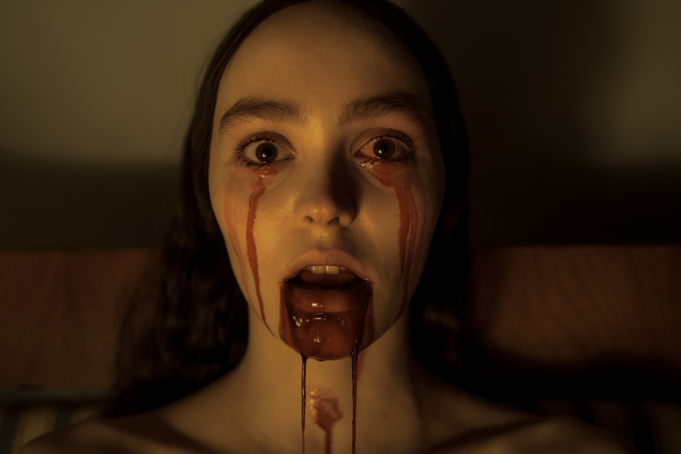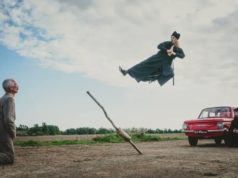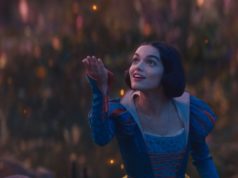Time once again for me to be a film-school nerd. May I direct your attention to the whiteboard. Like all other film-school nerds, regardless of our interest in vampires, I was made to study the 1922 silent vampire classic Nosferatu: A Symphony of Horror: how it related to German Expressionism and how director F.W. Murnau’s creative use of shadows would influence Tod Browning’s 1931 film of Dracula and so many others. Speaking of which, Nosferatu took so much plot from Bram Stoker’s novel that Stoker’s estate sued the filmmakers and won. Despite this, Murnau’s film spawned a venerable heritage from Werner Herzog’s fitfully effective Nosferatu the Vampyre to E. Elias Merhige’s cheeky homage Shadow of the Vampire. Now comes Robert Eggers’ remake, and I’m afraid it falls short of what you’d expect from this modern horror master.
Like Murnau’s film, this one takes place in a fictitious city on the Prussian seacoast in 1838. Thomas Hutter (Nicholas Hoult) is a real estate agent dispatched by his boss (Simon McBurney) to deepest Transylvania to negotiate the sale of a local castle to Count Orlok (Bill Skarsgård). Too bad Thomas doesn’t stick around long enough to see his boss committed to an asylum, where he bites the heads off pigeons. Even so, Thomas notices the count’s strange behavior before falling ill and becoming Orlok’s prisoner. The count wishes to feed on the blood of Thomas’ new wife Ellen (Lily-Rose Depp), who has been communing with the undead since her teen years.
The remoteness of Eggers’ settings usually keeps him from indulging in visual lushness, yet his evocation of the Germany of Goethe’s time has a lustrous beauty reminiscent of the movies of Luchino Visconti or Rainer Werner Fassbinder. His collaborating cinematographer Jarin Blaschke switches well between black-and-white and color stocks to show us both reality and Ellen’s nightmarish visions, and composer Robin Carolan contributes a properly eerie score. The movie emphasizes the theme of Orlok as a bringer of plague, which we’re primed to appreciate four years removed from a murderous pandemic, and it’s undeniably striking when the filmmakers show us the wide, clean German streets suddenly littered with rats and dead people.
An underrated facet of Eggers’ filmmaking has been his superb writing — remember Dafoe’s imprecatory monologue in The Lighthouse, with its deft alliteration and striking imagery? Here, though, it seems to get in Eggers’ way. He devotes so much energy to crafting dialogue that might seem credible from 19th-century Germans that he forgets to move the story forward. Once Thomas escapes the Carpathians and returns home, he and a cadre of male friends (Aaron Taylor-Johnson, Ralph Ineson, and Willem Dafoe) have to save Ellen before Orlok comes for her — on Christmas Day, no less — and as retrograde as this device borrowed from Stoker is, it should give the plot some momentum. Here it barely gives the movie an uptick, and if Eggers is trying to make a female tragedy about a woman failed by male experts in thrall to various superstitions, that comes across weakly.
Eggers typically creates horror with performances, atmosphere, and sheer weirdness rather than editing, and there’s too little of all those things here. A mother (Emma Corrin) seeing Orlok standing over the drained bodies of her young daughters doesn’t register like it should. Too much of the cast fills their roles without distinction, although Depp creates a genuinely frightening scene during a domestic argument when Ellen starts experiencing full-body convulsions and somehow remains lucid as she accuses Thomas of prioritizing his career over her. The movie could have used more moments like this.
Maybe Eggers is just too much of a film-school nerd himself. His version of the story hews so closely to Murnau’s movie that it flaws his vision. We’ve had more than 100 years of vampire lore, revisions, parodies, pastiches, glosses, and such, and going back to the source doesn’t reveal much to us in 2024. Even those dopey Twilight movies treated its bloodsuckers with greater creativity. So did Shadow of the Vampire and Renfield, which Dafoe and Hoult, respectively, starred in. Here we have a new Nosferatu for Christmas, and I’m not even sure what it’s for. As nice as it looks, I think this is going in the garage with the other Christmas presents I’m not sure what to do with.
Nosferatu
Starring Lily-Rose Depp, Nicholas Hoult, and Bill Skarsgård. Written and directed by Robert Eggers, based on Henrik Galeen’s script and Bram Stoker’s novel. Rated R.











